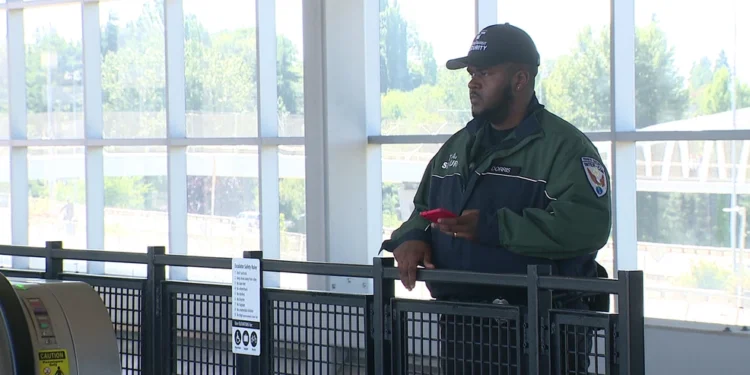Nearly 5,000 private security officers have authorised a strike that could disrupt safety operations across King County’s public transit system if wage negotiations fail.
SEIU6 members voted last week to authorise strike action after their labour agreement expired and employers offered a 30-cent hourly wage increase. The union rejected the proposal, demanding more substantial compensation for work that includes patrolling light rail lines and buses throughout the region.
“A 30-cent raise doesn’t do it, and so we’re going to continue to fight for an increase that allows our members to thrive in this economy,” said Greg Ramirez, SEIU6 deputy director and chief spokesperson for the bargaining team. “The theme from our membership is dollars, not cents.”
Security officers currently earn between $21 and $30 per hour on average. However, their responsibilities have expanded as Sound Transit and King County Metro have requested increased safety services for riders using regional transit systems.
“The dangers that come with this job, they over-exceed the payment offered, and we need to be compensated for it,” said Texas Perry, a transit security guard.
Officers serve as first responders for fire alarms, life safety issues, and mental health crises on transit systems. “We are first there for fire alarms, life safety issues, and you know, everyone is affected by mental illness, and we’re usually the first there to help de-escalate and get them the help they need,” said Rae Brimhall, a four-year security veteran.
Workers also cite stress and lack of supervisory support as compounding factors. “We go out there, we show out, we de-escalate the worst problems, and we’re not being appreciated,” said Shaquila Wilson.
Contract talks resume September 18th. If negotiations fail, union members could strike by month’s end, potentially reducing security presence on light rail platforms and buses across King County.
“When they are on those platforms, when they are on the trains and buses, their presence has an impact to deter incidents from occurring,” Ramirez said. “If they are not there, if they are not present, it could compound the problem.”
Sound Transit indicated it is working with security contractors to understand potential personnel disruptions whilst maintaining appropriate system safety staffing.
King County Metro noted that affected contracted security officers represent only 2 percent of workers covered under the contract, with approximately half of Metro’s contracted Transit Security Officers potentially affected by a strike.
“We remain committed to fair wages and treatment for all who provide essential transit services,” King County Metro said, adding that plans exist to maintain safety at key locations during staffing challenges.
The dispute highlights broader challenges facing security workers in high-stress, public-facing roles where responsibilities have expanded without corresponding compensation increases. The outcome may influence similar negotiations affecting security services across the region’s technology campuses and other facilities.







